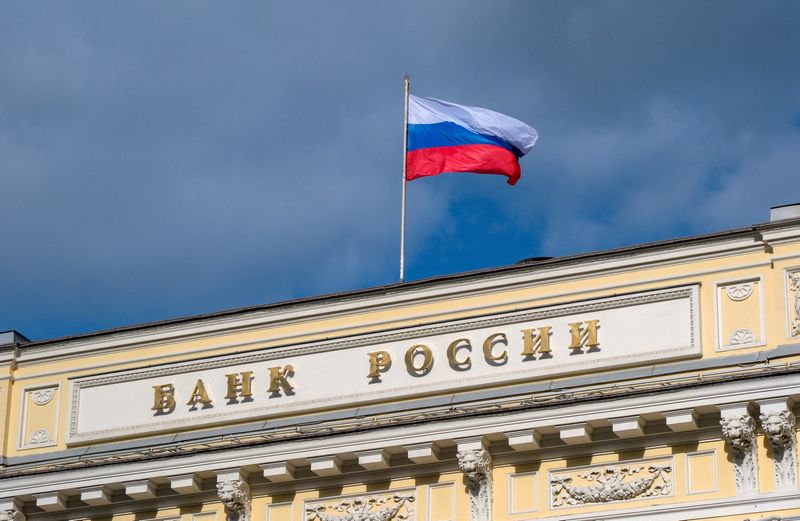LONDON (Reuters) - Russia's central bank jacked up its key interest rate by 350 basis points to 12% on Tuesday, an emergency rate move to try and halt the rouble's recent slide after a public call from the Kremlin for tighter monetary policy.
The extraordinary rate meeting came after the rouble plummeted past the 100 threshold against the dollar on Monday, dragged down by the impact of Western sanctions on Russia's balance of trade and as military spending soars.
The rouble initially firmed after the rate decision before giving up its intraday gains and weakening again.
COMMENTS:
TIMOTHY ASH, SENIOR EM SOVEREIGN STRATEGIST, BLUEBAY ASSET MANAGEMENT, LONDON:
"As long as the war continues it just gets worse for Russia, the Russian economy and the rouble. Hiking policy rates won’t solve anything - they might temporarily slow the pace of depreciation of the rouble at the price of slower real GDP growth - unless the core problem, the war and sanctions are resolved."
STUART COLE, CHIEF MACRO ECONOMIST, EQUITI CAPITAL, LONDON:
"It is an emergency response to the fall in the value of the rouble, which has recently suffered one of the fastest depreciations of EM currencies."
"While such a depreciation risks boosting inflation, it is also the signal it sends out to the Russian public about the costs of the invasion of Ukraine. As such, today's decision will likely have had an element of politics behind it as well as economics."
"The move will also have been an attempt to slow capital outflows, which have been seen as a growing problem as Russians seek to preserve the value of their assets."
"But, given the sanctions regime Russia is under, it is doubtful the move by the CBR will have much long-lasting effect beyond slowing even further any economic activity still being seen in Russia."
LIAM PEACH, SENIOR EMERGING MARKETS ECONOMIST, CAPITAL ECONOMICS, LONDON:
"Today’s rate hike will only temporarily slow the bleeding. The rouble’s depreciation is a consequence of many factors moving against Russia all at once. The current account surplus has shrunk drastically due to a slump in energy prices and export revenues as well as a rapid rebound in goods imports."
"Russia will struggle to attract capital inflows because of sanctions. And there’s little ammunition for FX intervention – the central bank has some unfrozen renminbi assets and gold reserves, but the bar for using these is likely to be high."
SAMY CHAAR, CHIEF ECONOMIST, LOMBARD ODIER, GENEVA:
"The rate hike is currency dependent; the currency is at levels we haven’t seen since just after the invasion."
"It’s very basic, understandable monetary policy management, you want to avoid the currency sliding too much, because it will create imported inflation, so the central bank is taking a very orthodox move."
SUSANNAH STREETER, HEAD (LON:HEAD) OF MONEY AND MARKETS, HARGREAVES LANSDOWN, LONDON:
"Faced with the highly volatile rouble following the plunge in exports and surge in military spending, policymakers at the Central Bank of Russia have stepped in with this move in an attempt to shore up the currency and stem further capital flight."
"Despite initially brushing off the rouble’s fall to a 16 month low yesterday, there are worries at the Bank that financial stability could be shaken further if inflation continues to race up further. However, with conflict in Ukraine entrenched, the sanctions grip tight and an ongoing voracious demand for new weapons, there is no easy escape from the economic fallout of the invasion."
"An interest rate hike had widely been forecast, so the rouble has failed to follow on from the significant rally late yesterday, with the move appearing to underwhelm, given the scale of the challenges ahead."
VIKTOR SZABO, PORTFOLIO MANAGER, ABRDN, LONDON:
"Clearly it seems that they have reached the pain threshold. I thought it would be a bit higher, but clearly they like the round numbers."
"It's difficult to say whether they're intervening, that is not something they normally do. I think it was just all the expectation about the meeting today."
"Now they will have to wait, but their main problem is that their trade surplus is shrinking and they can't do much about that."
IPEK OZKARDESKAYA, SENIOR ANALYST, SWISSQUOTE BANK, GLAND, SWITZERLAND:
"The impact is going to be quite limited from the central bank intervention as obviously the major problems remain and the biggest one is the Russian situation in Ukraine."
"The rouble's depreciation is not excellent news for Russia, especially in its financing of the war and also the Russian economy is under a different downside pressure due to the geopolitical issues."

VICTORIA SCHOLAR, HEAD OF INVESTMENT, INTERACTIVE INVESTOR, LONDON:
"Russia’s central bank hiked interest rates from 8.5% to 12% after the rouble’s sell-off to 17-month lows yesterday. The Bank of Russia said, ‘inflationary pressure is building up’ and ‘inflation expectations are on the rise’. The decision has helped to boost the rouble today which is regaining ground against the US dollar."